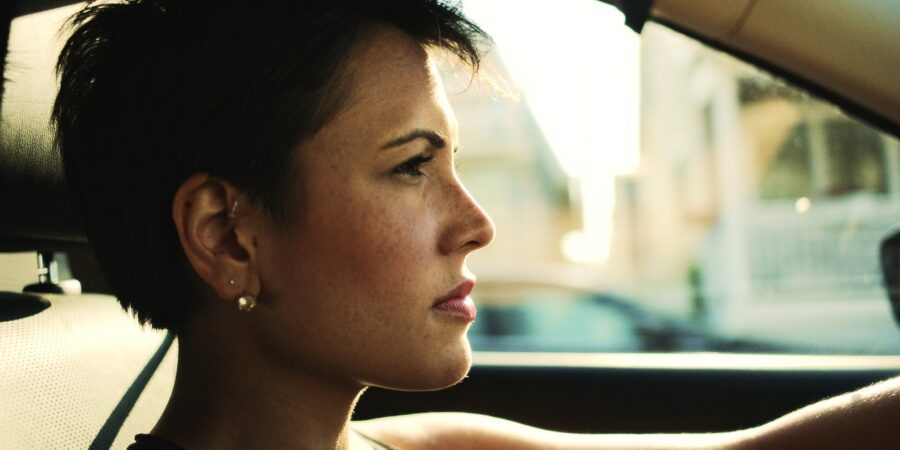Astrid Ovalles was raised in a Catholic family that immigrated from Venezuela to America when she was young. Her culture believed homosexuality was a sin, a view Ovalles fully internalized. But in high school when a girl kissed her, it rocked her world and left her wondering how something that felt so good could be so bad.
Ovalles started dating that girl and came out as lesbian. While not everyone approved of her identity, and some people called her sick, she found comfort watching LGBTQ characters like her in films and movies. After school, Ovalles pursued a career in acting and later began making films herself.
As an adult, Ovalles became interested in the world of kink, and she decided to work with men as a dominatrix. While she wasn’t attracted to them, she found the practice mentally stimulating. A female client came to see her, and they had incredible chemistry as a dominant and submissive. The woman wanted to be more than just a client, though Ovalles insisted on keeping it professional. She eventually buckled, and that woman is now her wife. They live together in New York City.
Ovalles found a great day job to pay the bills, and in her free time, she launched her independent film company, Recluse Films, to amplify the voices of women, LGBTQ people, and minorities. With the help of some creative friends, she made a lesbian film, Camp Belvidere, that found some success. When Ovalles and her wife were featured in the press, they chose to be openly kinky and not hide their D/s (dominant/submissive) relationship.
But coming out had a price: Ovalles was on the receiving end of judgment that felt similar to when she came out as lesbian. People who previously supported her now said she must be sick and was abusing her wife. She was crushed since they engaged in consensual activity with healthy communication, which they viewed as empowering.
To help her process this experience, Ovalles made her latest film, Road of Bygones, with the help of her wife. Released in March, this film was written, directed, and starred in by Ovalles. It follows three women on a road trip who struggle with an unusual dynamic and confront taboos. According to the film’s official description, it provides “a glimpse into the reality of a lesbian D/s relationship and the search for acceptance from those who we adore.”
Read on for our interview with Ovalles, where she discusses her multiple coming-outs, working to normalize BDSM and openly kinky relationships, and filmmaking to increase visibility for minority communities.
Profiles in Pride: What was your experience coming out as lesbian?
Astrid Ovalles: I have a few coming out stories, because your sexuality as you get to know yourself can become clearer, or morph. For some it’s like a lightbulb. When I decided I wanted to be an actress, I joined the drama club in high school.
I was raised Catholic, so I was very against homosexuality — that was what I was taught. I was taught it wasn’t supposed to be something you did, that homosexuality was immoral. So I was one of those people who went around preaching that being gay was immoral.
Until one day in a drama class rehearsal, a girl named Liz kissed me, and she ended up being my first girlfriend. We’re still friends now! I think that was one of the best days of my life, and I couldn’t figure out why. I went home so freaking happy. I just thought, is this so bad? It didn’t feel so bad!
After that we started dating, and we were together for a while considering it was high school, like two-and-a-half or three years. That was me coming out as lesbian. I didn’t really have a bisexual stage. I thought I liked boys, but when I realized I liked a girl, I was like, “No, I like this a lot more.”
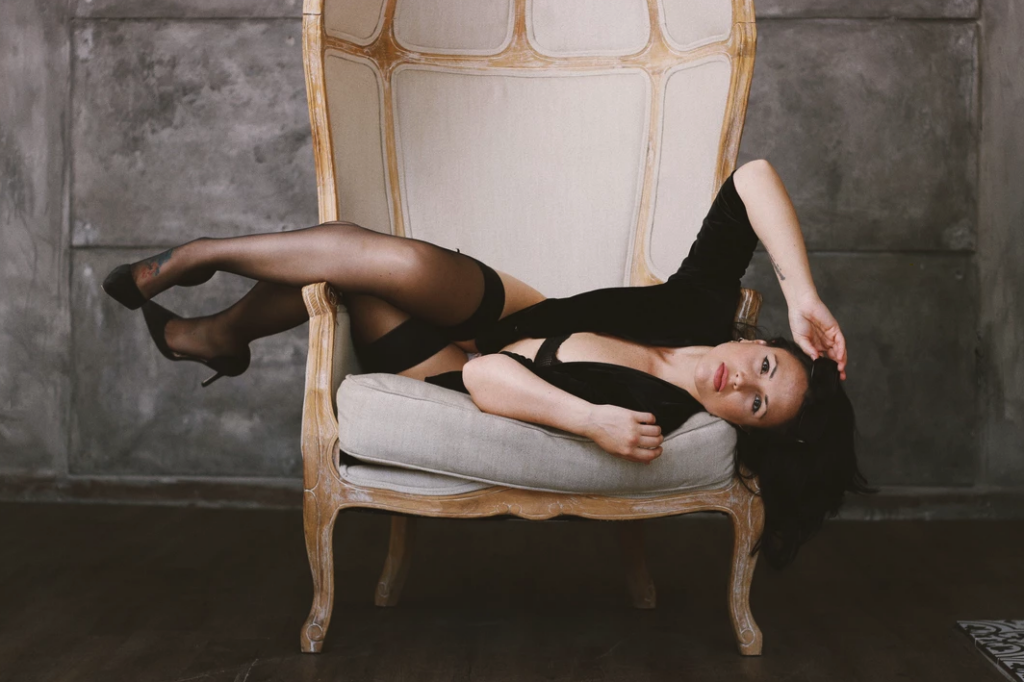
Later I came out as kinky. Not until I was almost 30 really. I was reading a book about a dominatrix in New York City, just fictional reading for fun. As soon as she started talking about all the things she’d do, I was really interested in it. Not just sexually, but it was mentally stimulating for me.
I thought I’d like to try it, and I became a professional dominatrix with men. I enjoy doing those things as a mentally stimulating or recreational exercise. One day I got an email from a woman who wanted to be a submissive, and that’s how I met my wife! She was a client! She was new to it.
We were business, and I was trying to keep her away because I didn’t want to cross that line. However, she was very persistent that she wanted to be more than just a client. We continued to see each other outside of that. One day she had to go to England for something, she went away for months and I couldn’t stop thinking about her. We would Skype all the time.
By then I was pretty sure I was kinky. I call myself a Dom with her. I’m not sure I would be with every woman I meet; I think it has to do with the relationship with the other person and your dynamic with them. But I do lean towards being in a D/s couple. It’s definitely the best relationship I‘ve ever had, and the most comfortable I’ve been in my own skin is being a Dom with someone who enjoys being a sub naturally.
When we were together, I kind of discovered something else just a few years ago. I don’t call myself polyamorous, because I don’t really know the exact rules of the world of polyamory — we just kind of do our own thing. But we’re not monogamous either. We don’t date someone separately; we date someone together.
The first time we dated a third person together, I remember again the same feeling I felt when I was in the theater class and the girl kissed me. I was so content to be with more than one person. We communicate a lot since we’re D/s and are always checking in with each other and communicating. We’re not always having a good day. We ask, “Are you still OK with seeing this person?” because we have to be on the same page with a lot of things.
I’ve heard that a lot of people assume one person’s not enough for me. For me it’s sad that anyone would think that. The way my wife explained it to me is when she sees me with another person, she sees how much love I have to give and how much affection I want to give people. It doesn’t make her feel at all like she’s not enough; I’m just a loving person who likes to be happy and affectionate and share love and passion.
When I was reading on your bio about what you were saying how you were bisexual and later started using queer, I relate; I’ve recently started using queer. Because I’m lesbian, but also some other things! As we get older we find out things.
That’s part of why I do what I do with my movies. Sometimes you don’t know until you see something. I wouldn’t have known I was Dom until I read that book, and when I saw Professor Marston and the Wonder Women and the relationship they had as a couple, I was like, “Oh, this is it!”
I went to the screening with [the film’s writer and director] Angela Robinson and I got to take a picture with her; it was really cool! I think that’s why I do what I do. Because you sometimes don’t even know what’s out there. Once you see it or get a glimpse of it, something sparks up and you realize it’s something you can do with your life.
I’d like to have as many experiences in my life, and my partner is open and communicative enough and loves me enough to try everything with me at least once.
Those are my three coming out stories!
PIP: When did you first get into filmmaking, and what drove you to it?
AO: I always wanted to act and I thought that was it for me. I decided that when I was around 12. I was very into it, and my mom and family were very supportive of the arts and always have been, so I grew up around the arts. I didn’t have a hard time convincing my family it was my career — I say that because a lot of people do!
I moved to New York and was sick of getting roles that were background talent and silly things I wasn’t into. The more time I spent on set for student films and other peoples films, I thought it seemed like something I could definitely do. I got sick of waiting.
So my best friend and I wrote and made Camp Belvidere together; it came out in 2014. We did it to test the waters to see what it would be like to make a movie. We had made little things before. She was into the media and I was into acting and we’d play around.
Fortunately I have a really good day job that allows me to have some free time and do a lot of things that I want to do, so I was able to make Camp Belvidere in a few years. To my surprise, people freaking loved it and went crazy for it! I have a lot of fans from it and we got a lot of press.
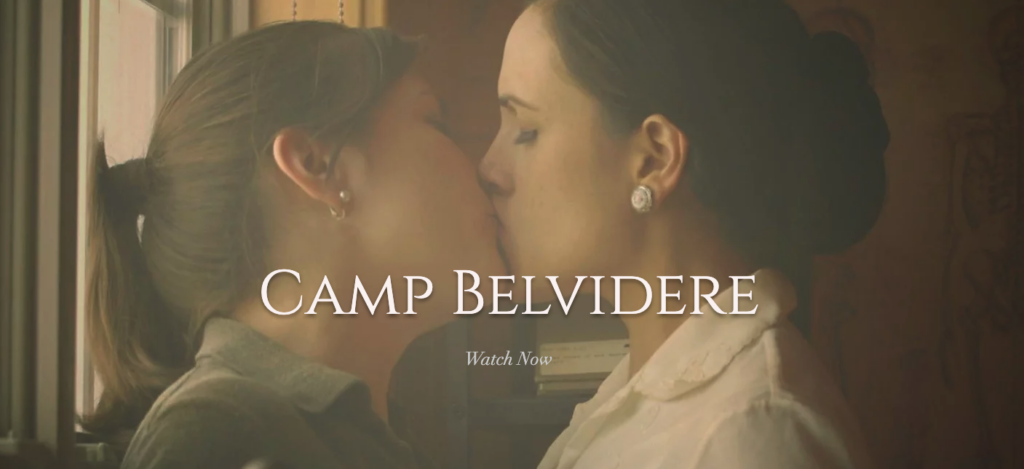
When I was doing it, it was very natural to me. I really enjoyed every aspect of filmmaking. I’m a painter, so I loved the visual side. I worked with the director of photography very closely, and everything we did, we decided together. He was a risk-taker and of course, I don’t come from a regular school background — I just come from a do-it-yourself background. So we were doing things rogue and in a cool way. It was just like playing dress-up with your friends.
Then I formed my film production company, Recluse Films, because I wanted to tell stories that were not only for LGBTQ people and women, but stories that are human and that we don’t often see. I also like to play around with the art itself. Like Camp Belvidere, I wanted to make it like lesbian pulp fiction novels. I loved those and thought as I was reading them it would be so cool if someone made a movie with this kind of vibe. Like that super dramatic and exaggerated drive, very angsty and colorful like a caricature. I decided I was just going to do it!
Wth my latest film, Road of Bygones — I love dark comedy and French cinema. I love how in French films, they present a lot of relationships that aren’t standard. I don’t like the word “normal,” but I’ve yet to find a word to replace the feel of the word So I’ll use “normal,” but I don’t think anything is normal. I wanted to make a movie that was told in humor, make people laugh and show them something different. Then, while they’re laughing, maybe they won’t realize it’s that different.

PIP: Could you talk about the importance of visibility and representation in your work, both as a queer person and immigrant?
AO: I grew up with my mom; I have a very close relationship with her, and she’s my hero in every way. What we’d do for fun is watch movies and TV together, and she’d never censor anything from me. If something was weird or odd or adult, she’d just explain it. I was lucky that she was a very progressive mom. I was lucky I got to watch all these things as a kid and she’d explain the human aspect to me in ways that weren’t keeping me from them but helping me understand humanity, choices, relationships.
I think seeing homosexuality in movies was what made me start thinking about it at a very young age, around 8 or 9. Of course I didn’t want to have sex with anyone, but I felt attracted to women. I wasn’t sure what it was until I saw two women getting married in that episode of Friends when Ross’s wife comes out. That’s when I knew I was gay; I saw that on TV, and that saved me a lot of time!
Because of my upbringing being Catholic — that wasn’t so much my mom, more my great grandma — I pushed it down. It’s about what you see! You see it every day. People talk about the arts and film and TV as just fluff or superficial. I’m generalizing that a lot of people see it as entertainment and don’t see the intellectual or emotional support value a TV show or movie can have, but I think it’s there.
Because storytelling is human. We tell each other stories all the time. Whether in books, music, etc., that’s how we connect with one another. That’s how we decide as a society what’s going on in the moment. It’s how we fit in, it’s our nature. By bringing all these things into media, into film, making it an art, people laugh along with the characters and cry along with the characters. It’s a stupid word, but it “normalizes” something you may not have seen. It gives you a chance to sit with it. Think about it. Think about whether you think it’s good, bad, wrong or right.
As far as race and those things, I never really related to any Hispanic material, anything Venezuelan especially. So it’s very nice for me to be able to be in these movies and have fans from South America. Fans that have the same upbringing as I did and see themselves on TV. Of course I don’t have the budget to make super diverse films; I can only cast a few people at once. But I am hoping to grow to a point where our films can be very inclusive and bring everyone in, story allowing.
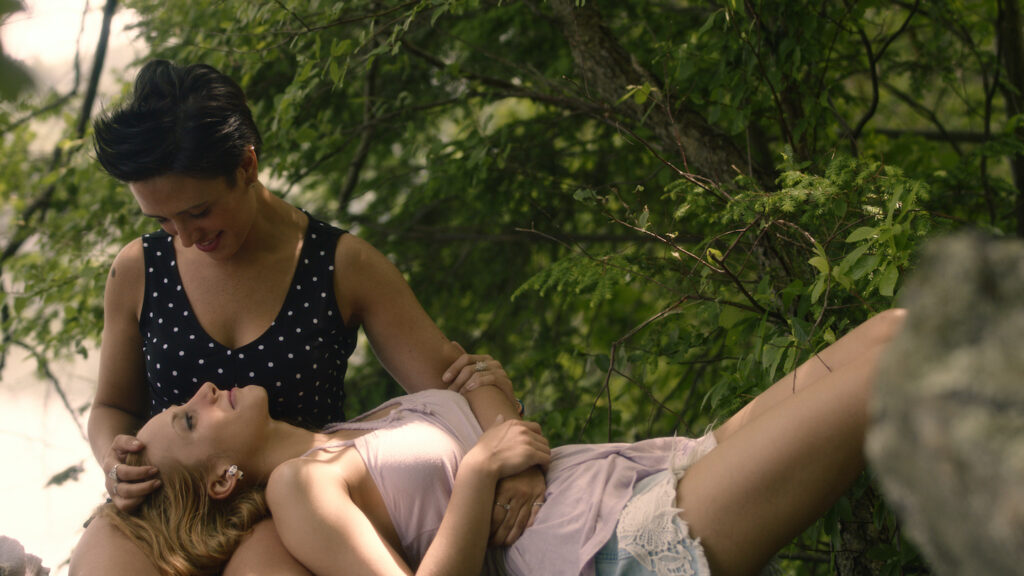
I think it’s paramount. I don’t think people give film enough credit. I think seeing yourself on TV or film and feeling like you’re part of this world is essential for happiness and feeling like you belong.
Sometimes people in the LGBTQ community feel like they don’t belong unless they’re at the gay bar or at an LGBTQ event. It’s something I think we’re not aware of at the forefront of our minds, but I feel like we feel at home when we see something similar to us.
The more diverse we get with art, the happier people will be, the more it will shed this pressure to make your kids not gay. Maybe we’ll stop killing teenagers and trans women. I think to me it’s common sense, but I know people don’t see film and TV that way; I think they treat it like an activity that can be superficial. To me it’s never been superficial. To me it’s important to have that diversity in film and television.
PIP: Absolutely. Have you faced a lot of discrimination for being openly kinky? I know many people still view it as taboo.
AO: Oh, absolutely. That’s why I actually put the D/s relationship into this movie. This movie could have had any type of relationship. The reason I chose D/s, which is domination and submission, is because in 2014 after making Camp Belvidere, we were very open on the Internet and social media about who we were.
When we said we were a kinky couple, I remember reading reviews and message boards, and people said we were sick and we must have been abused. Or I was abusing my wife and she didn’t know what she was doing. It was a horrible feeling to have your own community talk about you like that.
We’re trying to give our two cents to the community by making these things. When we look at what people say about it and that we’re sick — the same thing they were saying when I came out as gay — I felt like not only now do I have to battle people outside the community, but also inside our community where there’s this stigma and ignorance that’s very ugly.
My way of fighting is to show it on film, because that’s my medium. Even promoting the film, I thought, everyone wanted me to make another romance movie or something similar. But I felt like I really had to do this. I think social justice comes before hobbies, and although film for me is a hobby, I think I can pair it with social justice for as long as I need to.
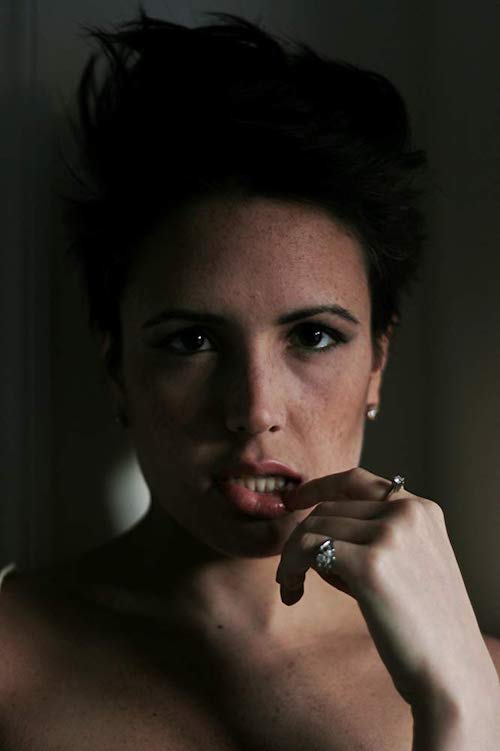
Until I get it out of my system, I wasn’t going to be content. Even in promoting this film, we got a lot of emails saying, “We can’t promote this movie, we don’t like what you and your wife do.” One woman said it’s anti-feminist, which doesn’t make sense to me.
Some people have kids and didn’t want them to see it. I said it’s not about sex or wrong; I believe if kids are asking questions about a certain topic, l’d rather educate them about communication and consent and boundaries, rather than going off with nothing and being in a situation where they don’t know what they’re doing and not being able to communicate with a partner.
I don’t agree with those things and I don’t think I’m wrong on this in allowing women to give consent or communicate their boundaries. I don’t think it’s anti-feminist or anything wrong with it. I don’t think kinky people are abused or that it is related. If it is, that’s someone’s business and that’s valid as long as they’re doing it in a way that’s healthy. You can do anything as long as there’s consent. That’s my rule. Consent and communication.
PIP: Yes, to me it seems like there’s nothing more feminist than women feeling empowered to safely and consensually express themselves.
AO: It’s been tough; I knew the movie would be hard to promote in the lesbian and bi community. I know gay men are more open to kink, and we’ve been more welcomed in the gay male community. But with gay and bi women, we’ve faced a lot of backlash and it has s hurt. We felt like we couldn’t sit at their table anymore.
I made this movie for that reason. When you do something like that, maybe you change someone’s mind. If you can’t, at least there are other people like you who will feel seen.
There have been a lot of lesbians who have said they were D/s too and also in the closet about it, and slowly started coming out about it, saying, “My wife and I do this but we don’t tell people.” There are a lot of people who were closeted for their kinks. Some kinks are much more taboo than ours. Some people like it that way.
But when we say stuff like, “We like that it’s taboo” or “we like that it’s a secret,” I feel like — speaking for myself, when I say stuff like that, I’m protecting myself from what I really feel. If I really wanted it to be a secret, it’s because that’s what I want, not because I have to hide it.
I think it should be more noticeable in the media, because a lot of people have kinks and don’t know that they have kinks. I’m a very open person and very artistic and get around a lot, and didn’t know I was a Dom until my late twenties.
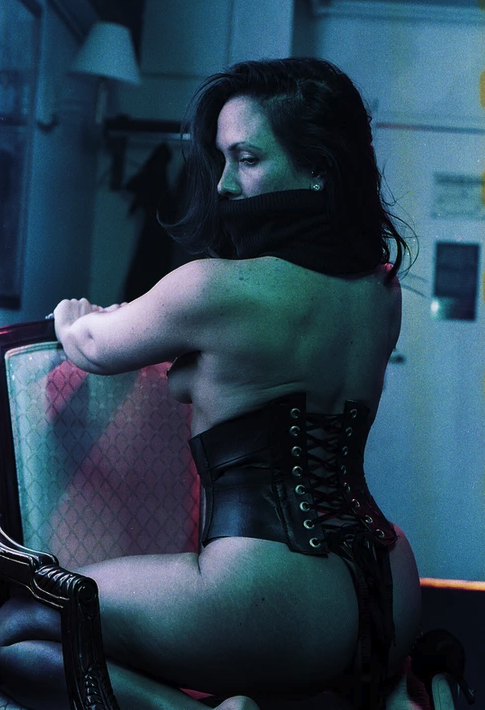
It’s been rough; I went through a huge depression after coming out as a D/s couple because my community was my rock, and to hear people calling me sick again…I was used to it for being gay, from straight people and religious people, but I hadn’t heard it from my own community. That’s why I put these characters in Road of Bygones.
To me it comes down to consent. If it’s a woman’s desire to have her kink be fulfilled and she’s telling her partner, “This is what makes me happy, these are my boundaries, this is my safe word” — that’s empowering to the woman.
Even if it’s not something you’d ever do, it’s about your body. If you can say ‘no,’ you can also say ‘yes’ and you should be heard. Your ‘yes’ should be heard, and your ‘no’ should be heard loudly and respected.
But if you say, “Yes I’d like this,” your partner should hear it. They shouldn’t make an assumption about what’s best for you. No one should. I’m just trying to show a piece of my world, and if they want to listen, they can. My main priority is for other people who are D/s and kinky to feel like you are a part of the community; we’re here too.
Keep up with Astrid and her work on her website, AstridOvalles.com.

